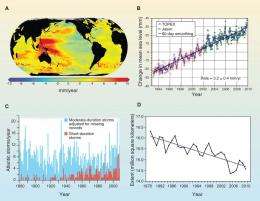Ocean changes may have dire impacts on people

(��������Org.com) -- The first comprehensive synthesis on the effects of climate change on the world’s oceans has found they are now changing at a rate not seen for several million years.
In an article published today in Science magazine, scientists reveal the growing atmospheric concentrations of man-made greenhouse gases are driving irreversible and dramatic changes to the way the ocean functions, with potentially dire impacts for hundreds of millions of people across the planet.
The findings of the report, “The impact of climate change on the world’s marine ecosystems” emerged from a synthesis of recent research on the world’s oceans, carried out by two of the world’s leading marine scientists, one from The University of Queensland in Australia, and one from The University of North Carolina at Chapel Hill, in the USA.
Professor Ove Hoegh-Guldberg, lead author of the report and Director of The University of Queensland’s Global Change Institute, says the findings have enormous implications for mankind, particularly if the trend continues.
He said that the Earth's ocean, which produces half of the oxygen we breathe and absorbs 30% of human-generated CO2, is equivalent to its heart and lungs.
“Quite plainly, the Earth cannot do without its ocean," he said.
"This study, however, shows worrying signs of ill health.
“It’s as if the Earth has been smoking two packs of cigarettes a day!”
Professor Hoegh-Guldberg said: “We are entering a period in which the very ocean services upon which humanity depends are undergoing massive change and in some cases beginning to fail.
“Further degradation will continue to create enormous challenges and costs for societies worldwide.”
He said that we may soon see “sudden, unexpected changes that have serious ramifications for the overall well-being of humans,” including the capacity of the planet to support people.
“This is further evidence that we are well on the way to the next great extinction event.”
The “fundamental and comprehensive” changes to marine life identified in the report include rapidly warming and acidifying oceans, changes in water circulation and expansion of dead zones within the ocean depths.
These are driving major changes in marine ecosystems: less abundant coral reefs, sea grasses and mangroves (important fish nurseries); fewer, smaller fish; a breakdown in food chains; changes in the distribution of marine life; and more frequent diseases and pests among marine organisms.
Report co-author, Dr John F. Bruno, an Associate Professor at The University of North Carolina, said greenhouse gas emissions were modifying many physical and geochemical aspects of the planet’s oceans, in ways “unprecedented in nearly a million years”.
“This is causing fundamental and comprehensive changes to the way marine ecosystems function,” Dr Bruno said.
“We are becoming increasingly certain that the world’s marine ecosystems are approaching tipping points. These tipping points are where change accelerates and causes unrelated impacts on other systems, the results of which we really have no power or model to foresee.”
The authors concluded: “These challenges underscore the urgency with which world leaders must act to limit further growth of greenhouse gases and thereby reduce the risk of these events occurring. Ignoring the science is not an option.”
In their study, the researchers sought to address a gap in previous studies that have often overlooked the affects of climate change on marine ecosystems, due to the fact that they are complex and can be logistically difficult to study.
Renowned coral reef scientist and former chief scientist at the Australian Institute of Marine Sciences, John “Charlie” Veron, says studies of coral reefs have previously dominated investigations into climate change impacts on marine environments, giving rise to the impression that this is simply a “reef problem”.
“This paper gives a refreshingly holistic approach to this subject where reefs have no more profile than other marine ecosystems: the subject is bigger than reefs,” Dr Veron said.
Provided by University of Queensland
















